Arrive in Kathmandu, the capital city of Nepal. Today you’re meeting your team. You’ll be a part of an Everest climbing expedition, meaning that you can stay at Base Camp proper once you reach it!
Elevation: 4,344 ft / 1,324 m
Accommodation: Hotel
Everest Base Camp Trek is likely the most famed route in the world and certainly one of the most scenic ones. Make your pilgrimage into the high Himalayas—with a slow acclimatization schedule—until you reach the Everest Base Camp. While most trekkers only reach “Trekkers Rock” and quickly return down to the Khumbu Valley, you’ll get to spend 2 nights at Base Camp and meet the Everest expedition community. Apart from the camp, you’ll stay in traditional teahouses on the trek, allowing you to learn about the Sherpa culture. And just when you start missing the everyday bustle, you’ll return to Kathmandu, Nepal’s capital, from where you began your journey.
Arrive in Kathmandu, the capital city of Nepal. Today you’re meeting your team. You’ll be a part of an Everest climbing expedition, meaning that you can stay at Base Camp proper once you reach it!
Elevation: 4,344 ft / 1,324 m
Accommodation: Hotel
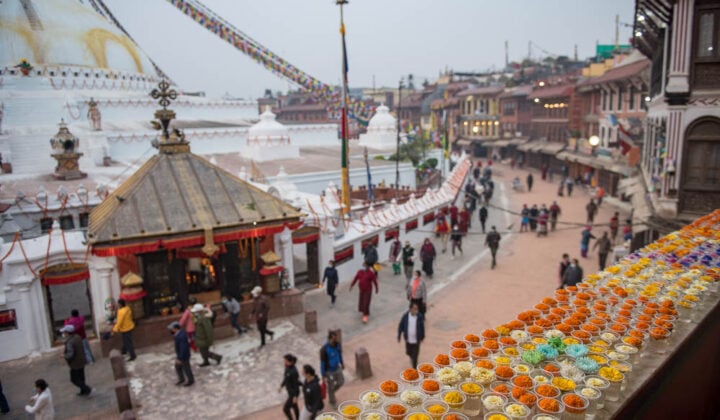
Today is your free day in the historical city of Kathmandu—we encourage you to explore it! You and your team will also obtain climbing permits. Have dinner together with your team, get to know each other, and have a briefing.
Elevation: 4,344 ft / 1,324 m
Accommodation: Hotel
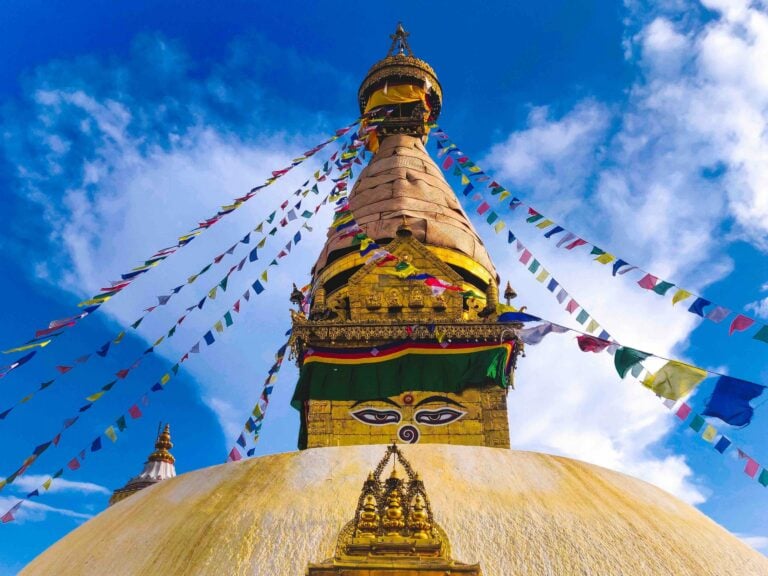
The trek begins by flying into Lukla. This is a 35-minute flight serving you scenic views from the air. Once you arrive here, it’s all trekking going forwards. The trail will take you through mountain villages, suspension bridges, and forests all the way to Phakding, where you’ll stay overnight.
Elevation: 8,562 ft / 2,610 m
Accommodation: Teahouse
Hiking: 5.1 miles / 8.2 km
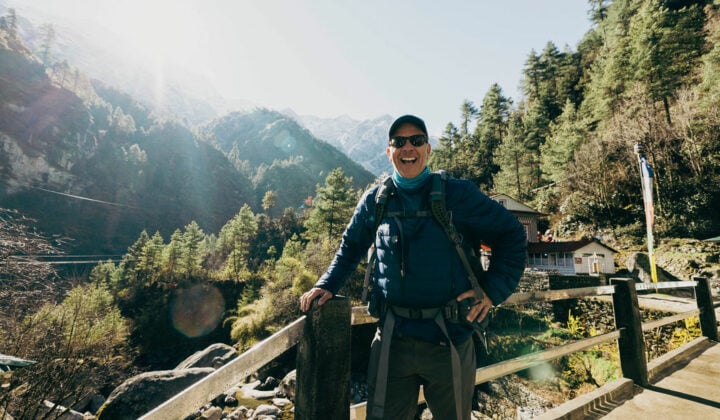
After a hearty breakfast, start your trek to Namche Bazaar. You can expect similar scenery from yesterday, passing through verdant mountains, suspension bridges, and over rivers. Get to Namche, a historic trading center of the Khumbu region, and spend the rest of the day here.
Elevation: 11,286 ft / 3,440 m
Accommodation: Teahouse
Hiking: 6.8 miles / 11 km
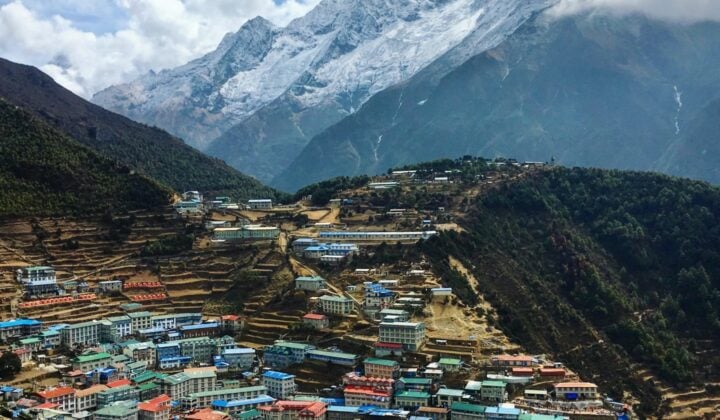
This is your rest and acclimatization day in Namche Bazaar. Often called the “Gateway to Everest”, this small town has everything from Tibetan artifacts to delicious food and trekking equipment. Apart from exploring the unique town, this day also serves to let your bodies acclimatize to higher altitudes.
Elevation: 11,286 ft / 3,440 m
Accommodation: Teahouse
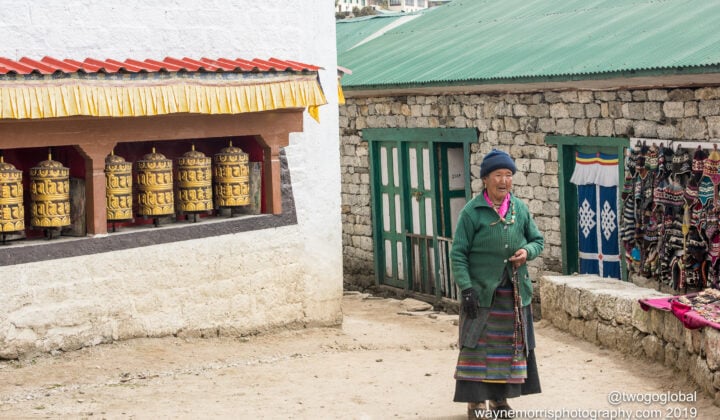
Continue walking through the Himalayan wilderness. On the trek to Tengboche, you’ll see incredible views of Lhotse and Everest. Once you reach Tengboche, a small alpine valley, settle in as you’ll be spending one extra day here.
Elevation: 12,687 ft / 3,860 m
Accommodation: Teahouse
Hiking: 6 miles / 9.7 km
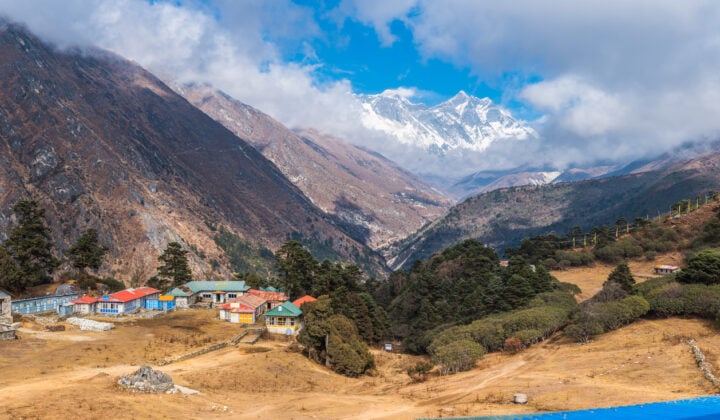
Here you’ll find one of the most famous monasteries in Nepal—a large Tibetan Buddhist center in the Khumbu area. A visit to the monastery will deepen your knowledge and understanding of the Sherpas. You can also enjoy the daily morning and evening praying ceremony.
Elevation: 12,687 ft / 3,860 m
Accommodation: Teahouse
Hiking: 7.4 miles / 12 km
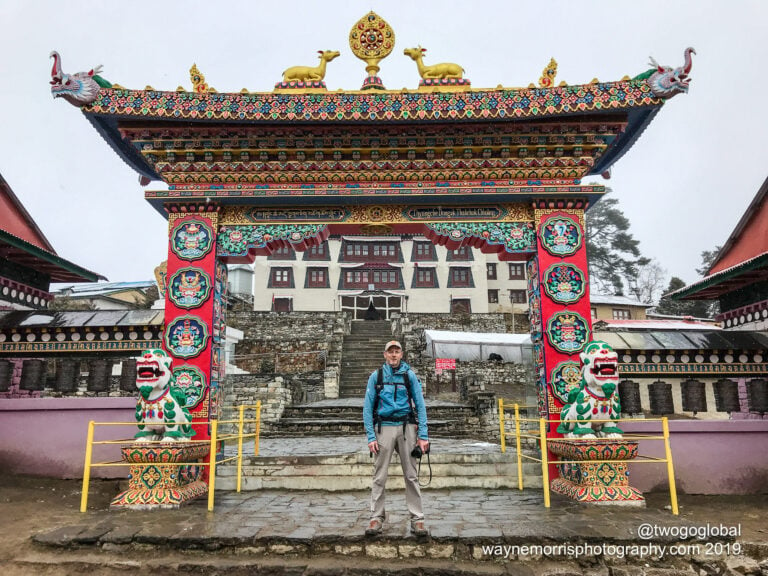
Today’s trek takes you to Pheriche, a charming village dwarfed by towering peaks surrounding it. This is an important acclimatization stopover, so you’ll spend day 9 here as well.
Elevation: 14,340 ft / 4,371 m
Accommodation: Teahouse
Hiking: 7.4 miles / 12 km

Before continuing onto the Everest Base Camp, take an extra day in Pheriche to acclimatize and rest.
Elevation: 14,340 ft / 4,371 m
Accommodation: Teahouse

After a good rest in Pheriche, continue onto Lobuche Base Camp. Lobuche is a small Himalayan village with only a few teahouses.
Elevation: 15,750 ft / 4,800 m
Accommodation: Tented camp
Hiking: 4.5 miles / 7.25 km

Departing from Lobuche, move forward along the Lobuche Glacier and enjoy stellar views surrounding you. You will take an acclimatization hike to Lobuche High Camp (17,715 ft) for some of the best views of the Himalayas! Return to Lobuche Base Camp for the night.
Elevation: 15,750 ft / 4,800 m
Accommodation: Tented camp
Hiking: 2.4 miles / 3.9 km
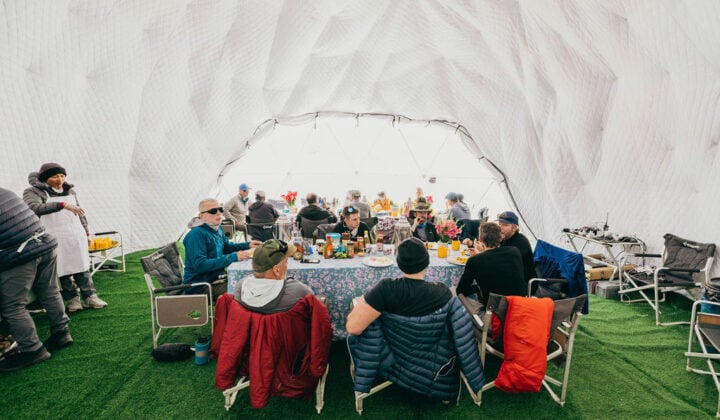
The last stopover before reaching Everest Base Camp is Gorak Shep, a small settlement with the highest tea house. Get some rest before the big day!
Elevation: 16,942 ft / 5,164 m
Accommodation: Teahouse
Hiking: 5.6 miles / 9 km
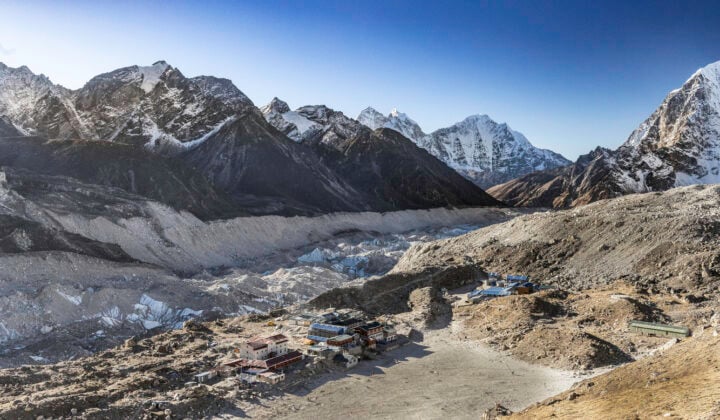
Today’s the day—you’ll finally reach the Everest Base Camp! Unlike many other tours, once you reach the basecamp, you won’t have to go back to the valley. You’ll get to stay in the actual base camp itself and get to know the climbing community. Explore the camp and the surrounding areas, marveling at the mighty peaks around you.
Elevation: 17,598 ft / 5,364 m
Accommodation: Everest Base Camp (tent)
Hiking: 2.7 miles / 4.4 km
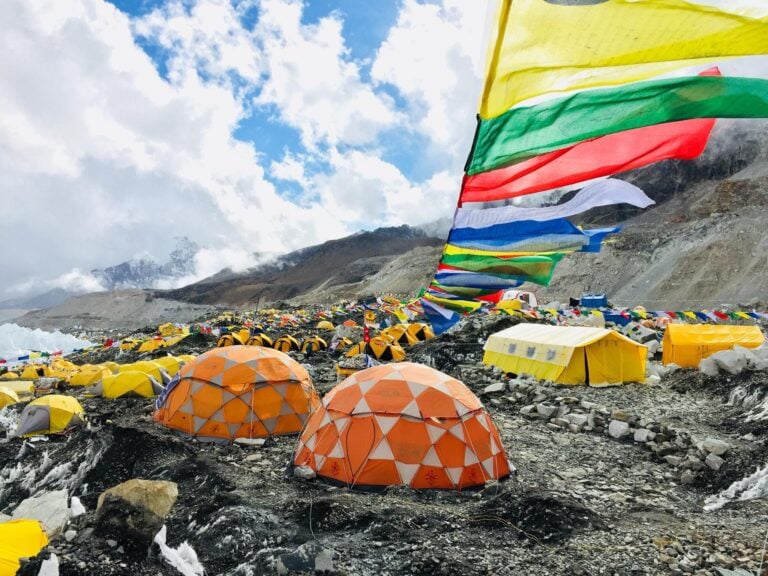
Today you can explore the camp and you have the option to partake in a beginner-friendly ice climbing clinic on the Khumbu Glacier below the famed icefall. Before heading down the valley, you have one final night at Base Camp Proper.
Elevation: 17,598 ft / 5,364
Accommodation: Everest Base Camp (tent)
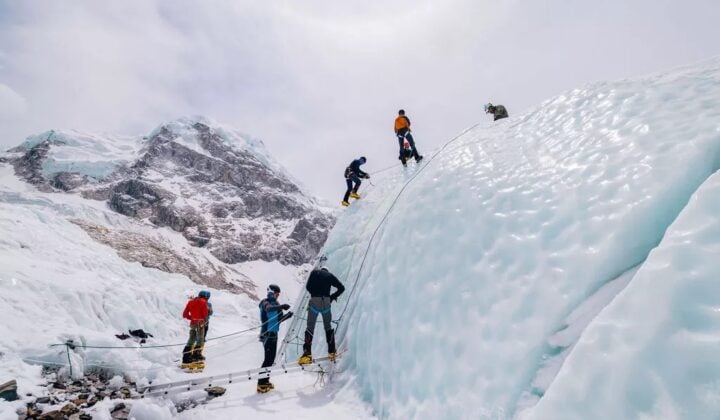
Prior to going down the mountains, follow the trail to Kala Patthar. This is a stellar lookout point with soaring views over Everest and the Khumbu Icefall. Continue towards Pheriche.
Elevation: 14,340 ft / 4,371 m
Accommodation: Teahouse
Hiking: 8.6 miles / 13.8 km
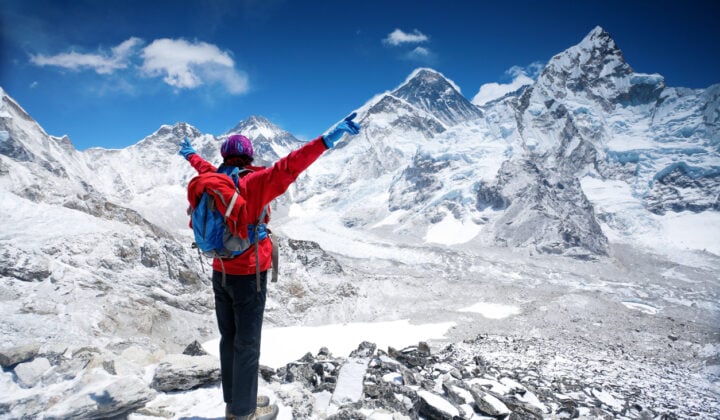
Descend back to Namche Bazaar. If you’ve had your eye on some Tibetan artifacts, this is a great chance to collect some souvenirs.
Elevation: 11,286 ft / 3,440 m
Accommodation: Teahouse
Hiking: 13.4 miles / 21.6 km
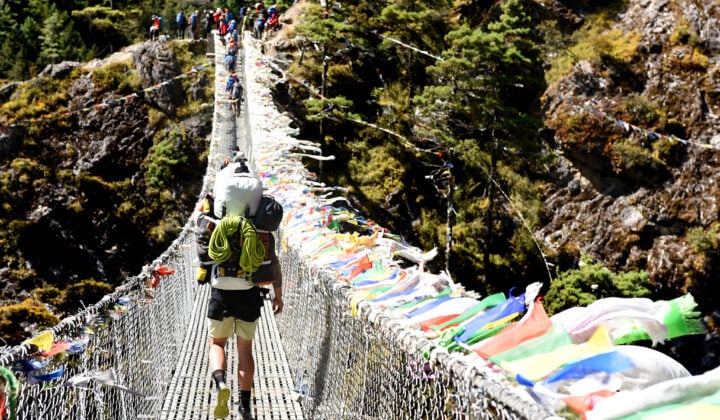
The final step of your Everest Base Camp trek is returning back to Lukla. Explore this tiny Himalayan settlement and the surrounding area.
Elevation: 9,383 ft / 2,860 m
Accommodation: Teahouse
Hiking: 11.9 miles / 19.2 km
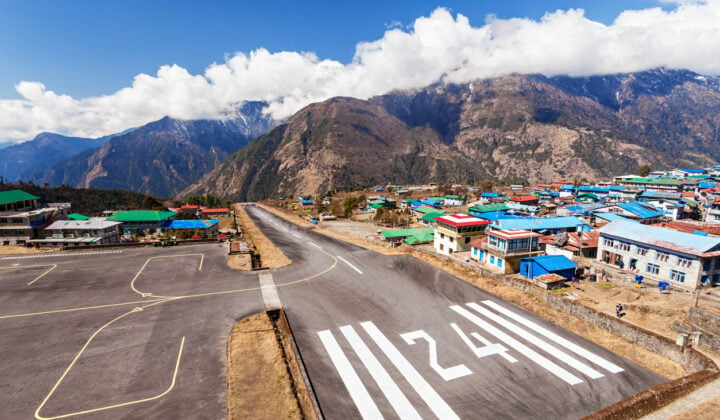
Departing from Lukla, a plane will take you back to Kathmandu. Settle into your hotel for the night and get a good night’s sleep.
Elevation: 4,344 ft / 1,324 m
Accommodation: Hotel
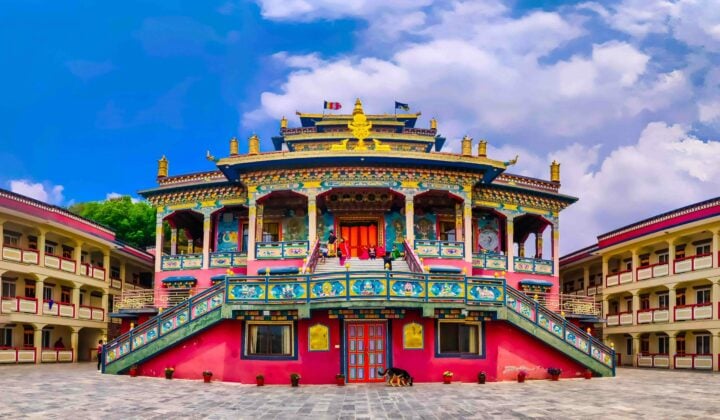
Have breakfast and pack up—it’s time to leave this wondrous country. If you’d like to stay longer, simply ask your guides for some recommendations, or they can even help you with extra hotel arrangements!
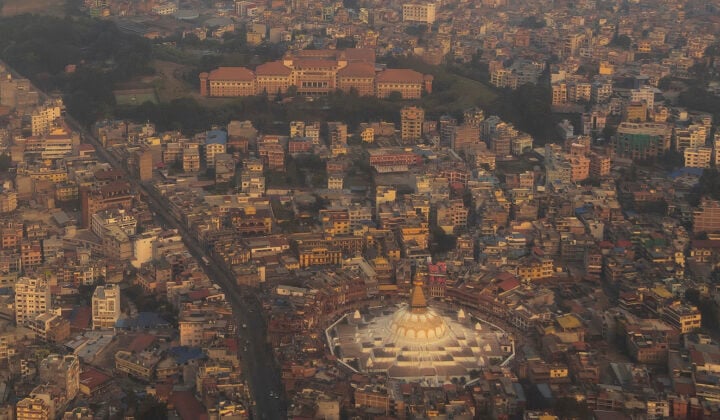
Unused contingency days are not included in the cost of your program. However, we highly recommend that you factor them in to account for any weather delays. We suggest buying a flexible return ticket so you can move your flight if needed. If you don’t use your contingency days on the mountain or decide to stay longer in Kathmandu awaiting your return flight, associated hotel costs are strictly your responsibility.
You will be welcomed into an actual Everest climbing team and trek alongside mountaineers who are attempting to scale the world’s largest peak! Apart from a terrific opportunity to chat with mountaineers, you’ll be invited to stay in a tent inside the Everest Base Camp. This is something that you won’t see most guided treks offering. Instead of just tagging the “trekkers rock” on the outskirts of camp and returning down into the valley, you’ll stay in the Everest Base Camp for two days (or even longer, if you’d like!).
Everything on this trip is held to the highest standard, and so is food! You’ll eat in the finest teahouses and once you reach the base camp, you can expect delicious dishes from a top-notch cook.
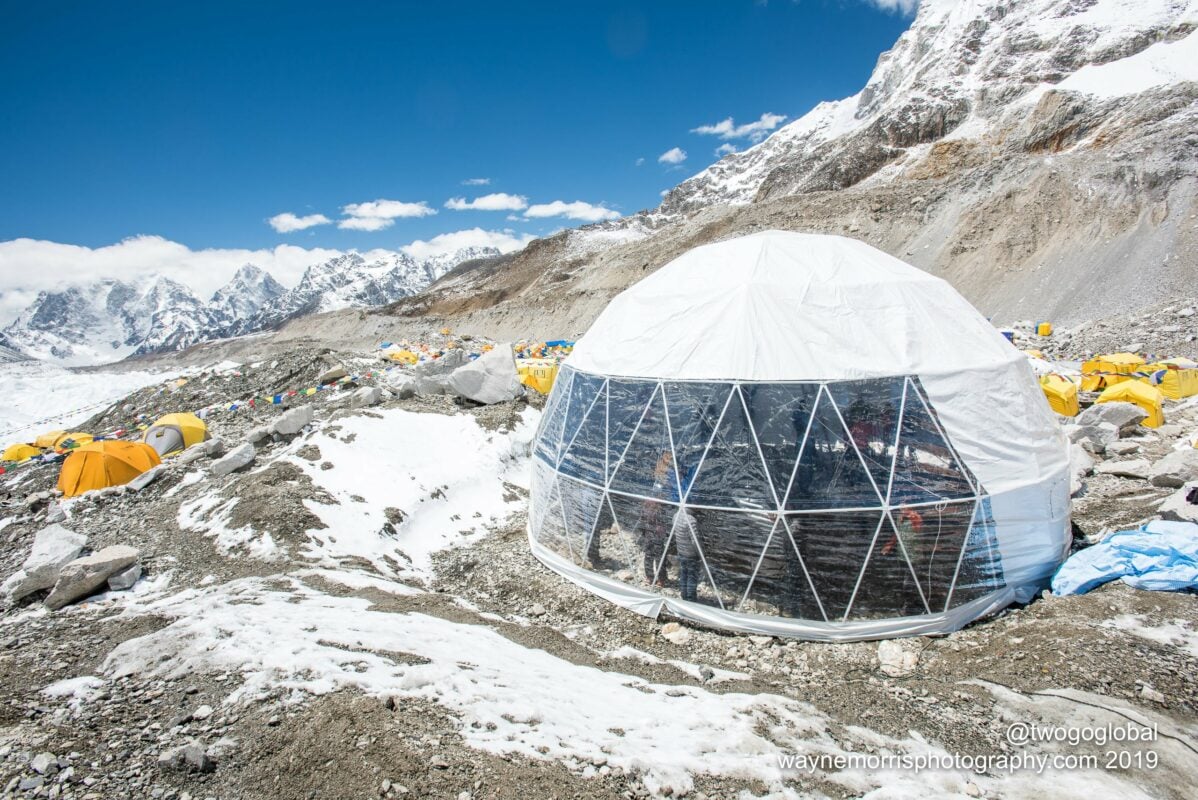
What you get on this adventure:
What’s not included:
Optional add-ons:
This gear list has been carefully compiled over years of treks and expeditions. Please take it seriously. All of the items on the list are mandatory. If you don’t have all the items on the list, you will be required to purchase them in Kathmandu. Please contact us for specific items or more details on items.
Clothing
Personal equipment
Personal items
While you don’t need to be super athletic in order to trek the Everest Base Camp, great fitness is still required. You will be trekking 5-8 hours per day and gaining on average 300 m (1,000 ft) in elevation. Apart from long hiking days, you’ll also be carrying your daypack with all things you might need throughout the day.
If you’re not already very active, training several weeks prior to the trek is a must—improving your cardio and strength endurance is key here. Trekking to the Everest Base Camp is by no means exclusively reserved for advanced climbers. With enough time to adjust to high altitude, some good preparation, and the right attitude, you will enjoy the trek and reach the base camp.
Walking at altitude is a slow process, so we encourage you to settle into the rhythm and pace set by your experienced guides. Enjoy taking in the magnificent views of the mountains around you, and the quaint villages that you pass through. There is no rush at altitude. You will spend 4 to 7 hours hiking each day. Be prepared to walk in all weather, and on undulating mountain terrain, crossing creeks and rivers and climbing some high passes.
From the minute you land in Lukla, you are at altitude, and your body requires time to ease and adjust to this new altitude naturally. One of the best ways to do this is to climb slowly. This itinerary is designed to allow time for acclimatization to minimize the stress of altitude on the body. However, illness at altitude can be experienced in varying degrees, from a slight headache, breathlessness or fatigue. Your guides know the signs and will work with you to help avoid and manage altitude illness. We will ask you to practice a very high level of hygiene at all stages of the trek. Your guides take many precautions to make sure we minimize the chances of our team members getting sick.
All your food on the trail is taken care of and dietary adjustments are possible.
Once you get on the Everest Base Camp Trek, you’ll stay at the finest teahouses, where hosts prepare delicious and locally sourced food. Once you reach the base camp, the food you’ll be served is the finest one on Mt. Everest. There will be a head chef, Kumar, who has been cooking for Everest expeditions for more than a decade and trains at 5-star hotels in the off-season.
Generally, while on trek and at the base camp, you can expect omelettes, pancakes, porridge, chicken, rice, stir fry, vegetables—sustainably farmed and local. You are certainly welcome and encouraged to bring some of your favorite snacks, though rest assured that your guides provide plenty of food and there will be opportunities to purchase snacks along the trail.
During your time in Kathmandu, you’ll be staying at the famous “Yak and Yeti” hotel. While you’re trekking, you’ll be staying in the finest teahouses available. And once you get to Everest Base Camp, you’ll be in a tent. Unlike most other Everest Base Camp tours, you actually get to spend the night here, not just tag “trekkers rock” and head back down to the valley. This allows you to mingle with mountaineers and experience the scene and the community of Everest expedition life.
Keep in mind that the hotel and the tent are always twin shared, as well as the majority of teahouses on the trek.
Apart from the fact that you’ll have a highly experienced and knowledgeable person by your side—who’ll also make sure you have the best time in the country—trekking in Nepal is no longer allowed without a guide. This decision has been made for the tourists’ benefit, as many tourists have gone missing over the past few years when they went trekking by themselves.
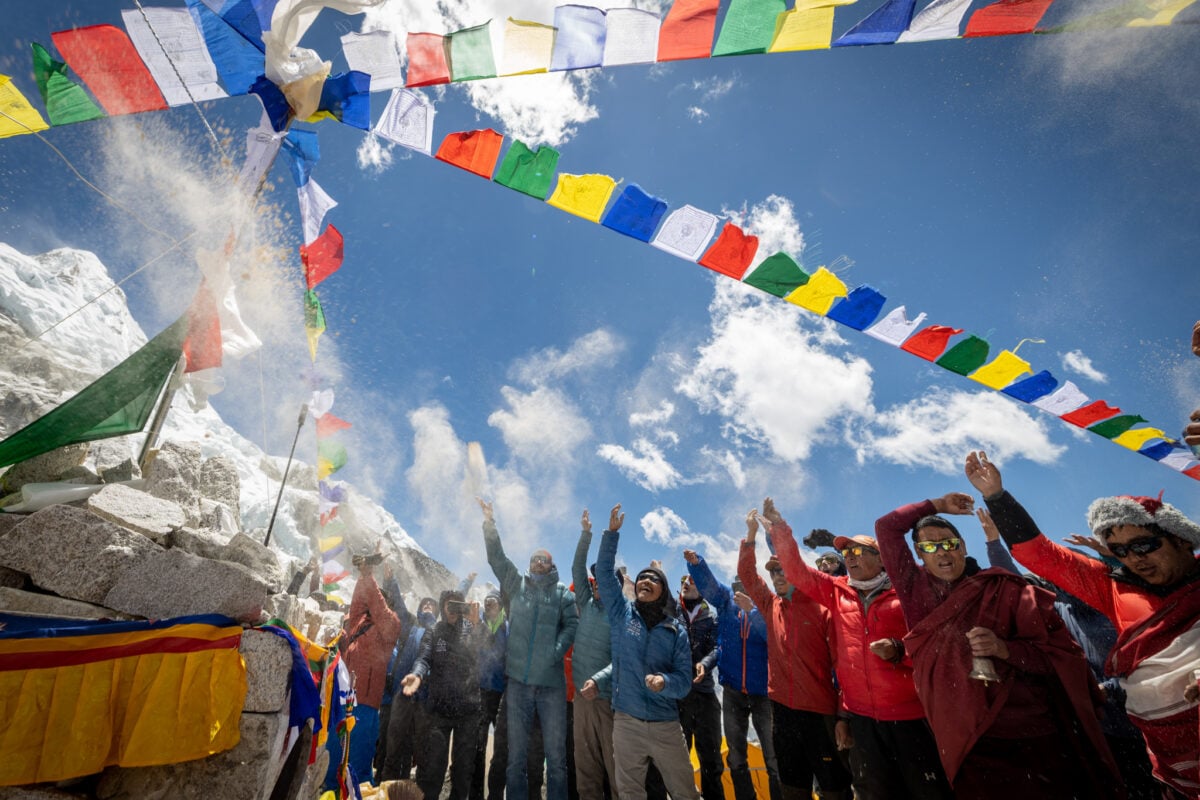
Group sizes and prices:
Trekking the Everest Base Camp can be arranged for larger groups. Contact us to make arrangements.
Min. age requirements:
If your group has hikers under the age of 18, contact us prior to booking to make arrangements.
To get to Kathmandu, Nepal’s capital and the starting point of your tour, most people fly into Tribhuvan International Airport. From there to the city, it’s best to take a bus or a taxi. Downtown Kathmandu is just a 15-minute drive away.
Once you and your guide agree on the details of your itinerary, your guide will suggest the best place to meet.
Yes, to visit Nepal, you must have a Nepalese visa. For the Everest Base Camp Trek, you will need a 30 day multiple-entry visa, which is valid for 6 months and costs 50 USD. You can easily obtain it as soon as you arrive in the country, which is usually at the Tribhuvan International Airport in Kathmandu.
57hours is committed to providing safe outdoor adventure experiences. We require all guides using our platform to have a COVID-19 safety plan and to make the details of that plan accessible to travelers. In most cases, group sizes will be reduced, guides will avoid overcrowded locations, and other safety measures will be met depending on the location and activity.
We also expect clients to respect local regulations and take measures to protect themselves, their guides, and the communities they’re traveling to. For more information on COVID-19 measures in Nepal, please refer to COVID-19 information by the U.S. Embassy in Nepal.
Please contact us if you have any questions or require further information. We are happy to provide you with the most up-to-date information!
